by Colin Deerwood
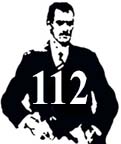
I stood in the doorway to Granny’s room. Ruthie was sitting on the edge of the bed, a bare gam poking out from under her robe.
“Look what I found!” She held open the large square black pages of a photo album. “There’s pictures of all of us up here for the summer. Cousin Dell used to take pictures of us kids with his Brownie, remember?”
I was surprised I hadn’t come across the photo album in my rummaging through the clutter of junk and cast off clothing. But her mention of Cousin Dell brought back a vivid memory of him wandering around with his little black box and pointing it at anything and everyone. We were all intent with swimming and wrestling and just generally acting like wild Indians, and Dell, who was older than the rest of us, wanted us to stand still. My old man said he was a pervert which at the time I didn’t know what that meant and then some years later I heard the story of how Uncle Ned had beat him up and banished him from Little Lake.
“Where’d you find that?” The pictures weren’t any bigger than a pack of smokes and I had to lean over Ruthie to take a good look.
“Under the bed, behind some old shoes.”
I remembered the ratty old shoes from my rummaging. Maybe Ruthie had a better idea of where to find it.
The robe had fallen open and a hirsute abyss stared back at me.
“Here’s a picture of Granny and the family in front of the cabin. Ned had just finished building the porch. Cousin Dell took the same picture every summer. And she has them arranged by year.”
I peered over her shoulder. “My first summer up here was 1920.”
She leafed a few pages over and pointed. “There you are! And that’s me on the other side with my mom and stepdad.”
I heard her catch her breath. The picture brought back a rush of memories. My mother, Mel, and my old man, Nate. And me standing in front of them, a skinny bean pole making what I thought was a funny face. Standing behind Granny was Ned, probably about my age now. Ned didn’t look anything like the rest of Granny’s children. They all looked like a combination of Gramps, who died before I was born, and Granny, but mostly knobby heads and big boned. Ned was slim and tall and looked mostly like Granny. And if the picture had been any bigger I might have been looking in the mirror.
There was something else. Maybe the lotion Ruthie had slathered on or some seductive scent or the combination of both. The way she was holding the photo album up I could see down the front of her loosely closed robe. I came alive in a manner of speaking. And I might have had one sip too many of moonshine because it struck me as funny. I had the rigid grin of a man whose fate is sealed.
Ruthie couldn’t help but notice either. She reached out. “I think I’ve found the missing tent pole.” Now she was sitting up, picture album tossed aside, intent on the buttons with her nimble fingers. The robe had fallen open and a hirsute abyss stared back at me. I didn’t resist knowing what was coming, and knowing that I knew it was coming the second she showed up with her kids wasn’t any consolation. I had to enjoy the inevitable even as I calculated that the cost in the long run would far exceed a reckless momentary pleasure. She pulled me toward her, a particular smolder to her gaze.
I heard a voice. It wasn’t hers.
“Knock, knock!” was accompanied by a rapping on the front door frame to the cabin. “Hello? Stan? Hello?” That such innocence could bring a momentary world crashing down or offer up other possibilities.
Ruthie stood up so fast she almost knocked me over cinching her robe closed. He eyes narrowed. “Who’s that?”
For a moment I drew a blank. Then it came to me like a long lost memory. “Marie.” And at her confused look, “The moonshiner’s daughter.”
Her mouth dropped open as she stepped from Granny’s bedroom and caught sight of the young girl filling out the bathing suit. I imagine mine dropped open too because standing in the cabin doorway was a pinup of the kind you’d find on any grease monkey’s wall.
“Well, Marie! How you’ve grown!” Ruthie exclaimed as she fixed me with a stare that should have turned me into a block of stone. I was just as dumb.
Marie was all smiles even though the glint in her eyes could have chiseled me to dust. Damned if I did, damned if I didn’t.
The kids had followed Marie into the cabin. They had come up to ask permission to take a ride around the lake in her rowboat. That had the effect of defusing the tension and I was for once thankful for children. Ruthie suggested that they all go for a row but making a point of excluding me as being one too many. I breathed a sigh of relief. The look that she threw me as they trudged down to the dock and the bobbing dingy was that of a woman scorned and I knew what that meant. The cook had got a fire going and was hacking at a dead chicken, water boiling in a big pot. She just shook her head in mock dismay.
I dressed in a hurry.
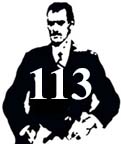
I was desperate. I was running low on cash. I couldn’t hesitate any longer. The haircut and shave was going to cost me. What I would normally pay two bits for was going to be twice that much. The only barber was over in Big Lake and he catered to the vacation crowd which is why his price was so steep. I’d become considerably more sober at the realization of my predicament.
I sat in the chair anyway. The shop was next to Big Lake Hotel Resort and Cabins, the ritziest of all the motor courts and hideaways ringing a good part of the shore. A wide display window looked out over the street outside and the entrance to the resort. The motor traffic was noticeable and raised hazy dust in the heat of a midday. A truck carting inner tubes rattled by headed for the beach.
The barber was a talker. He must have thought he was on radio. He knew all the latest news as well as the word about town, who was who, and where who was staying. He had a sidekick, a toothless old geezer missing his left arm, who ran the tobacco newsstand inside the shop, and who snorted and chortled and amen’d the big man with the scissors in his hand.
The headlines displayed in the newspaper rack screamed Britain Attacks France!
“Now ain’t that something. I knew something like this was gonna happen. Once you get to warring, everybody else has to join in. And I see what they’re up to. Using the war as a distraction.”
“Who you talking about?” the old vet gummed.
“Why John Bull, that’s who! They’ve always had a grudge against France. You’ve been to France, aincha, Bill?”
The old man smiled. “Hinky-dinky parlay vous.”
“Now here is the way I see it. The British attack the French and draws everybody’s attention away from what the Germans are doing. Meanwhile they’ve got armies massed along the border with the good old USA!”
“Mexico?”
“No, not Mexico. That’s what’s so insidious! The threat is to the north!”
“Eskimos?”
The barber nudged me with an elbow and a wink. “No, Bill, not Eskimos, but something almost as bad. Canadians. And I hear that some of them can’t even speak a word of English. You know what they speak? French, same as they talk in France. Now you can see that if they’re attacking the French in one place they’re going to attack them wherever else they’re speaking it. That’s their plan. And then they’ll be coming after us, try to reclaim their lost colonies. That’s been passed on from king to king ever since we whopped ‘em. Twice!”
“But don’t we speak English?”
“No, you’re wrong there, Bill, what we talk is one hundred percent American.”
Her I wouldn’t know from Eve, but him I knew. Paul E. Bello, aka Pretty Paulie, a well-known pimp smut peddler blackmailer from the big city, and if memory served me right, someone regularly seen in the company of Mr. K.
The barber heehawed and went on to something else. My mind was elsewhere. The picture that Ruthie had shown me. Anyone who didn’t know who was who in that picture might have mistaken me for Ned’s son. Maybe that explained a lot about what went on between mother and the old man. But he was a sailor, a girl in every port and a port in every girl. And she drank and swore like a sailor.
“Well, there you are!” the barber greeted accusingly as I noticed a shadow cross in front of the window and enter the shop. A black man in a light beige shirt and pressed brown slacks sauntered in. He gave the barber the stink eye and then nodded in my direction. “Shine today, sir?”
I looked down at my dogs and they looked beat. “Yeah, maybe spruce them up a bit.”
“Give ‘em the old Big Lake special, Rodney!”
Once the man had caught a better look at the condition of what I had on my feet, he shook his head in consternation. “Gonna take some work. Ten sense worth.”
“Why that’s highway robbery, Rodney! You’re gonna drive my customers away with prices like that!”
They both looked at me waiting for my reaction. I shrugged, “In for a nickel, in for a dime.” And to be honest, bringing those shoes back to some semblance of footwear would be worth a dime.
“What was the hubbub I heard earlier?” the barber asked the man as he retrieved brushes, rags, and cans from behind a cabinet and was lathering up the leather. “I heard sirens.”
“Found another one.”
“Another one? In the lake? Drowned?”
“They ain’t saying.”
“How many’s that so far this year?”
“This one makes three. All girls.”
The barber shook his head solemnly. “The Lake averages about half a dozen a year. Not only girls, but as you know, boys are stronger swimmers.”
“Weren’t no swimmer.” The rag snapped across my toe effecting a transformation. “Heard it was Judge Chandler’s daughter.”
Even old Bill gasped. “Oh, she was a wild one,” the barber opined. “I remember once. . . .” he went on but I had stopped listen. A sleek coupe had pulled up to the front of Big Lake Hotel and I recognized the man getting out on the driver’s side. A woman, and not just any dame, but one that had been buffed up to a shine, was waving at him with a big smile on her bright red smoocher. Her I wouldn’t know from Eve, but him I knew. Paul E. Bello, aka Pretty Paulie, a well-known pimp smut peddler blackmailer from the big city, and if memory served me right, someone regularly seen in the company of Mr. K. I didn’t get what he was doing in Big Lake but then I remembered the waitress at the café had mistaken me for one of the actors in the hush hush movie production at the Lodge. And if Pretty Paulie was involved, there was a good reason why it was hush hush.
I wasn’t the only one who had noticed Paulie the Pimp. The black man had followed my gaze. He too apparently knew who Paulie was and seeing my reaction, he took a closer look at me. And the fact that he was taking a closer look at me made me take a closer look at him. I knew him. He knew me. He was the shoe shiner in the building where my lawyer’s office was located, the lawyer I had found covered in a layer of flies and whose killers had been lying in wait for me on Kovic’s orders. This was the guy who was supposed to stop me if they missed me. Maybe he’d been sent to the minor leagues for his screw up. More than likely he was part of the Kovic mob fringe. And if that was the case then the mobster was too close for comfort.
There was a glint of recognition in his eyes but also uncertainty. Maybe it was the dark glasses and the beard that threw him off. But I had no doubt that it would come to him and I wanted to be as far away from Big Lake as possible by then.
The barber held up the hand mirror for approval of his handy work. Beard nicely shaped, my dirty blond locks clipped and held in place with pomade, I looked almost respectable.
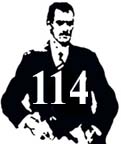
The trolley line ran down the center of Main Street from one end of Grover City to the other. As a sign of the times, a filling station had set up a pump almost directly across the street from the roundhouse. The attendant, an eager young guy in a collared shirt, let me stow the Indian inside the fenced yard behind the garage for a consideration when I got back from the County Courthouse.
I hopped an inbound trolley just as it was pulling out of the station. The conductor was big guy with a square head. He eyed me like he’d seen my sort before and flicked the lever of the chrome change maker on his belt. I remembered when the trolleys were horse drawn in this burg. And they were cheaper. It was the price of doing business and I paid it. And I’d picked up a copy of the daily blat when I left the barbershop that I could also charge to my nonexistent business account.
I was looking for nothing in particular until I found it. Behind the war scare headlines, Grover City’s only newspaper covered local news and politics of the Tri-Lake area. A public safety announcement in bold print urging swimming and boating safety during the summer months took up half a page. A sidebar noted that there had been two tragic drownings in Big Lake so far this summer. The edition had hit the stands before the discovery from earlier in the morning if the shoeshine man was to be believed. Another column reported that the search for Judge Chandler’s daughter was ongoing and that the State Troopers were now helping in the effort. I had news for them.
He slid the chair back, rose slowly, and just as slowly made his way to the counter as if I had interrupted him from his important duty and he was doing me a favor.
But what caught my eye was the item on the investigation behind the attempt to dynamite the Federal grand jury looking into the activities of fugitive mobster Yan Kovic as well as the foiled heist at the US Customs warehouse. Witnesses were being sought, it said, and I knew they were talking about me. I didn’t think I’d see anything about Becky’s body being found. The obits were all local, anyway.
Two of the names in the obituaries caught my attention, not because I recognized them but because of their ages. One was sixteen and one was thirteen. That one claimed the young girl “loved to swim” was the kind of unintentional irony that often showed up when talking of the departed, and I wondered if the other girl had drowned, too. But by then a few more riders had crowded onto the sidesaddle bench and I was running out of elbow room. Not that it mattered. The stone colonnades of the Courthouse hove into view and I stepped off as the trolley rolled to a stop.
Once I’d trudged up the wide granite steps and passed through the multi doored portal to the halls of justice, I followed the arrow and the sign that read Records to a stairway leading down to the basement. A corridor branched off in two directions at the bottom and another helpful sign pointed the direction. I came to a solid mahogany door framing a pebble glass panel upon which was written in bold black letters VITAL STATISTICS and turned the brass knob and went in.
At a desk beyond the counter stacked with an assortment of ledgers was a rail thin clerk in an eye shade and sleeve garters. I rang the desk bell to catch his attention otherwise I would have remained invisible. He slid the chair back, rose slowly, and just as slowly made his way to the counter as if I had interrupted him from his important duty and he was doing me a favor.
He looked me over and was not particularly impressed. “Marriage, Birth, or Property?”
“Birth.
“County or Municipal District?”
“County, I think.”
“I don’t take orders on speculation. You either know or you don’t.” He had that sour attitude of a minor bureaucrat.
“County.”
“Can’t help you here.” He jerk a thumb, “Next door.”
I thanked him with a nod of my head, did an about face, exited the door I had entered, turned right and opened the door that had County Records in bold black letters on a similar pebble glass pane. I could have stepped into the very same office because the very same clerk greeted me with the hint of a superior smile.
“Marriage, Birth, or Property?”
“Birth.”
He handed me a form. “Fill this out and put it in the basket.” He pointed at the stub of pencil wound with a string and then at the empty wire basket off to one side of the counter. “That’ll be three dollars.”
I was about to protest but since what I was planning was illegal I thought better of it. “How soon can I expect the document?”
“Depends on how busy I am and if I’m on the county payroll or the municipal payroll.”
I knew a grift when I heard one and decided to play along. “Of course, of course, I realize how busy you public servants are , especially at this time of year. I was hoping to expedite the acquisition by this afternoon as the document is germane to a probate matter in the city.” I’d heard lawyers speak that way and thought I’d give it a try.
He licked his thin lips, shifted his eyes to the left as if making a calculation, and asked in a lowered tone, “You on an expense account?”
I made a grimace. “No, unfortunately, I’m paid by the job, a flat fee.” I waited a beat before I made the offer. “I’m heading over to the diner I saw on my way in, grab a bite to eat, cuppa java. Do you recommend the place?”
“Oh sure, I go there practically every day.”
“That’s good to know. Maybe I can have them send you over a sandwich. A piece of pie?”
He looked over his shoulder like maybe someone might be watching. “County Registrar frowns on bringing food into the office.” He paused, “But I sure do like their pies.”
I’d hooked him and slowly reeled him in. “I’m partial to berry pie. What kind do you like?”
He didn’t hesitate. “Coconut Cream.” Then he got confidential. “Tell them Orvil sent you. They’ll set a piece aside for me.”
I returned a conspiratorial smile and quickly filled out the simple form and peeled off three dollars from my money clip.
“Check back around three o’clock for that birth certificate.” And as a reminder “Coconut Cream.”
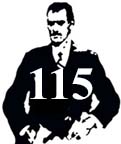
Grover City was easily forgettable, a wider spot in the road on the way to the widest spot. The red, white, and blue bunting was still up from the Fourth of July Parade. They probably still had a street sweeper on payroll judging by the number of horse drawn conveyances. One such specimen in blinders drew a large drayage wagon past me as I stepped to the curb. The Downtown Diner was catty corner to the park fronting the Courthouse in a square brick building with large windows flanking the step up double door entrance and overlooking Central Avenue. The airiness at the front tables were taken up with matrons and tea biscuits. I found a booth in the hazy amber light back by the swinging double door to the kitchen.
I looked over the menu the young girl made up to look older than she was had handed me. I didn’t look at the items, I was looking at the prices. The java was a must but the sandwiches were more than I wanted to pay.
It must have been the pained look, but she asked, “You want me to read that for you?”
I laughed and shed the shades. “No, I can see just fine. My eyes are sensitive to the light.”
She peered at me as I removed the fedora and set it on the bench next to me. “Oh, that’s an excuse I haven’t heard before. Tied one on, did ya?”
Her smile was bright but not hard on the eyes. “That bad, huh?”
“Any worse and I’d be calling a doctor. Are you ready to order?”
For twelve cents I could get four pieces of toast and jam, the coffee was on the house with any food order. “I’ll have the toast and coffee.”
“Sorry, that’s a breakfast order. We stopped serving breakfast half an hour ago.”
Despite being a looker, she was beginning to be annoying. “You on a budget?”
I tried to look offended but she just shrugged and pointed at the menu in my hand with her pencil. “This lunch special here, the sandwich, at two bits, it’s a pretty good deal. Comes with clam chowder, a side of grits, and generous slice of ham with pickled onions and the cook’s own homemade mustard.” When I hesitated, “Unlimited refills on the coffee.”
I nodded, “Alright.” And as she was about to walk away, I remembered. “Hey, Orvil, over at the courthouse, recommended this diner. I said I’d treat him to a slice of pie, coconut cream.”
She turned and gave me a grim look. “Coconut Cream?” She flipped the menu over and pointed at the list of very pricey desserts. The Kountry Kokonut Kream was listed at one whole dollar. “A slice?” I almost squawked.
She shook her head. “Don’t sell them by the slice. You’re buying the whole pie.”
It was still an expensive proposition and I hesitated. “Why don’t we just forget it, then.”
“Are you doing business with the county clerk?”
“I am. How did you know?”
“Would you like this business to get done soon?”
“Yes, this afternoon at the latest.” And then I got the drift. “What if I didn’t want any pie for me or anyone else?”
She shrugged. “The boss rents out rooms upstairs. At a weekly rate. They ain’t cheap.”
Not that I should have been surprised, grift greases the wheels of any bureaucracy.
I folded and the waitress quipped, “Be thankful he didn’t ask for Banana Cream pie, that’d set you back three clams.”
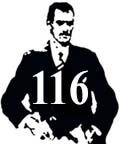
It was a day for coincidences. Just as I was coming out of the Courthouse with a birth certificate in the name of Jerome Paulson, striding up the wide granite steps toward me was none other than John “Johnny Tomato” Damato, the king of the mob mouthpieces, accompanied by a couple of hard faced bruisers. I turned away as they passed briskly behind me, uninterested in anything except where they were going. That alone convinced me that Kovic was operating upstate while lying low from the feds. If I’d been more paranoid I would have thought they were following me.
The trolley had a stop conveniently in front of the Odeon. The marquee read “Back By Popular Demand! Gone With The Wind!” The afternoon matinee had just let out and there were clots of young movie goers adjusting to the heat and brightness of afternoon daylight, some queueing up for the tram. A gaggle of young girls practiced their Southern drawls on each other. “Did you hear what he said?” one asked affecting the accent, and she lowered her voice, “Damn.” Her friends giggled nervously, pleasantly scandalized.
I turned my attention to the queue as the rumble of tracks and a distant bell announced the trolley’s arrival. I don’t know how I missed it but there parked by the curb was Pretty Paulie’s snazzy coupe with Paulie leaning against a fender smoking a cigarette and looking very suave in his expensive sporting togs and Panama hat. Something that was not lost on the young and impressionable female types whose urges had just been mix-mastered by the drama of larger than life images on the theater screen. The hook was Paulie’s alluring companion, a looker who could have just stepped out of the picture herself and attracting as much attention as Paulie.
I glanced over my shoulder as the tram pulled away. If I was the suspicious type, I’d think that Paulie was trolling for local talent. But it wasn’t any of my beeswax. Then I thought about Marie and knew she was just the type to fall for a con like Paulie’s. And that made me think of Rebecca. It was still difficult to admit that she was dead. It was my fault. I let her ride along on my mission of revenge.
I throttled up and tore after the coupe and soon was eating its dust. I gave the Scout more gas closing up behind and angling to pass.
But it all had started with the diamonds in exchange for the code book, and then the double cross, and the shootout. Only to get away with the sachet of diamonds she had stolen from Herr Doktor Soloman’s safe and then to lose them dodging the G-Men. And ended on the terrace of the Serbian Social Club with the bomb built by her father exploding in an assassination attempt on Mr. K and the Black Hand, knocking her off the ledge she had been perched on, and sending her to her death four floors below.
I thought of the diamonds for a while and the lost opportunity they represented. They were a fluke when I was in need of just such a fluke. Too good to be true as they’ll always tell you. And that’s what it was, a pipe dream. After Grace left for the Hollywood, my I-don’t-give-a-damn attitude put on weight. Mad at the world, I was ready for a fight. I’d knocked around as a private hood for a while when I was younger. That’s why I knew a lot of the players. Then I help someone out of a jam, just because they looked like nice people, and it paid off. Best of all, I liked the way it made me feel. Like maybe I was worth something, a hero, in their eyes at least. Still it was a hustle and making ends meet wasn’t something I knew much about. And I wasn’t dealing with the best or the nicest of people. So when I did meet someone who wasn’t like the others, it made me think. And I thought about someone who was innocent and trusted me, someone I’d failed. Rebecca.
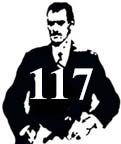
I was still thinking about the diamonds after I’d tipped the kid two bits for keeping an eye on the Indian while I was conducting business. I’d rolled up to the highway getting ready to head back to Little Lake when I recognized the sporty coupe breezing by. That was my third sighting of the day. If I’d managed to turn those diamonds around, I would have had my own roadster to visit all the resorts and spas. What bothered me wasn’t that a crumb like Paulie had all the goods and the breaks, but the face that peered out the rear side window as it passed. It was a young face, a frightened face. I could have sworn it was Rebecca, but I didn’t want to believe my eyes.
I throttled up and tore after the coupe and soon was eating its dust. I gave the Scout more gas closing up behind and angling to pass. I let up as a farm wagon puttered into view from the opposite direction. At Paulie’s speed the road opened up again in no time. I gunned it and slowly pulled up alongside. He had his head turned, yakking at the dame, and she facing him caught the movement of my shadow out of the corner of her eye. That made Paulie jerk his head around and look over his shoulder. I had just enough time to glance into the rear window where I’d seen the apparition of Rebecca’s face. A suitcase blocked part of the window and beyond that was what appeared to be a pile of overcoats.
I got the mean eyes as I pulled up even with the driver. If looks could kill. I don’t think he recognized me. He wouldn’t know me from Adam. But I did recognize the bird sitting on the bench next to him now that I had a closer look, someone from way back, when I worked as muscle at a gin joint. And as if she’d seen a ghost, she recognized me, too. Paulie may have had more engine but I was pulling less weight. I gave him the secret Boy Scout salute as I roared ahead.
A large man in a sweat stained hat stepped out from where he’d been stationed and held up his hand, a shotgun cradled over his left arm. “Private property, pal. Turn around.”
The road taking me back into Big Lake was lined motor courts and claptrap cabins. I’d left Paulie far behind when I turned off and stopped behind the large sign that said Lake Shore View Cabins & Spa and waited for the perfumed chump to buzz by. I was suddenly curious about what Pretty Paulie was doing in Big Lake and with whom. I didn’t have to wait long. Summer light dripping a slow orange onto the skyline glanced off the windshield as a bright glare. He wasn’t moving slow like maybe he thought he’d catch up with me.
I let him get ahead of me slowed down by the crowds of vacationers, many in straw hats and light dresses wandering in and out of the shops along the main drag. The latest model roadsters and coupes shared the curb with farm wagons and Model-Ts. I’d expected him to turn into the entrance to Big Lake Resort as it was the classiest spa on the lake with a large hotel dining room and nightclub. I was wrong. He kept going on Main St to the outskirts where it becomes the road to Ridley and to Little Lake.
I kept sight of the coupe far enough off his rear horizon that he might not catch me tailing him in the mirror. The coupe broke a rise in the road and dropped out of sight down the other side. By the time I crested the hill I had a clear view of the road ahead into a valley of farmland and wooded tracts. The coupe was nowhere to be seen. Even at top speed that machine could not have covered that much roadway.
I pulled to the shoulder and scanned the distance. They couldn’t have disappeared into thin air. Then I glimpsed the dust churned by wheels on a dirt road lifting up behind a stand of trees. At the bottom of the hill the tumbled down remnants of an old stone wall marked the wagon track. I had seen the outline of the bulky stone manor between the trees from the top of the rise and I figured that was where the coupe was heading. It was part of Big Lake Resort. I remembered hearing about it when I was a kid, an elite hunting lodge, although everyone referred to it as The Lodge along with the assumption that not just anyone could stay there. I figured this was the back road in.
I waited till the dust settled before I nosed the Scout onto the dirt track. I followed it slowly a ways up over a gulley and around a turn as it climbed the hill toward the lodge.
A large man in a sweat stained hat stepped out from where he’d been stationed and held up his hand, a shotgun cradled over his left arm. “Private property, pal. Turn around.”
He was a lot bigger than I was and didn’t seem the least bit concerned that I knew it. “This ain’t the road to Little Lake?” I ventured innocently.
He shook his head unhurriedly and gave a gapped toothed smile. “Not by a long shot, mac. Now turn back around. At the pavement take a right. If you pass through Ridley, you’ve gone too far.”
I thanked him and turned back the way I’d come. Both sides of the track were densely wooded with sycamore and oak, some maple, and a smattering of spindly pine. I bounced back to the pavement and let my eye follow the contours of the boulder strewn hillside and the brush cluttered ravine that creased the hill directly below the lodge. If I was going to take a look at what Pretty Paulie was up to, it was going to take a hike to find out.
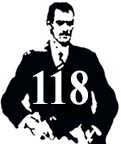
I found myself up a tree, a leafy ancient chestnut, overlooking a courtyard at the rear of the swank hunting lodge. I also had a clear view of the two gleaming machines at the front entrance to the large stone manor. The one I recognized as Paulie’s coupe and the other was a large Chrysler New Yorker with a white hood and a ruby red finish.
I’d made my way to my perch with less effort than I’d imagined. I’d found a deer track through the thicket that eventually widened to a faint overgrown foot path that ran along the side of the ravine and continued up the hill and alongside a six foot stone wall, tall enough to boost me up into the lower branches of grandfather chestnut and provide me with a catbird seat of the entire layout.
And there I sat considering my next move. There were large windows set into the stone edifice and I thought that I could creep up to the shrubs that bordered the lodge. I heard a shriek. It was a laugh and it was followed by a long legged beauty in tennis togs with a drink in her hand. She was followed by Paulie Bello and the woman from my past, Jean or June, who was leading a young blonde girl that was not Rebecca and not more than sixteen toward the table and umbrella next to the elaborate spouting nymph fountain at the center of the courtyard.
“Oh, Stan, I’ve just learned the most horrible news. My friend, Sissy, is dead. They found her in Big Lake this morning. They say she drowned.”
I didn’t have to be a genius to know that something was wrong with that picture and I would have followed my hunch to the logical conclusion except for the fact that it was put completely from my mind by the figure who emerged from the shadow of the umbrella. I’d recognize that stubby pink bullet head anywhere. It was none other than Mr. K!
It was obvious that Paulie had brought him something that pleased him by the wide leer on his mug and how he kissed the young girl’s hand continental style.
I’d see enough. I realized that I really wasn’t that interested in Paulie’s business after all. And Kovic was a powerful enough reason to relocate. I abandoned my leafy bower and started back down to the trunk which was considerably harder than going out on the limb. I was about to swing down to the rock wall when another motorcar drove up to the front of the lodge. I froze. I recognized that car and I knew the driver. It was Thorny!
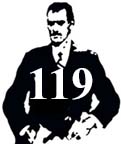
I made like a bat and got the hell away from there. As I raced back to Little Lake I was still shaken by what I’d seen in the courtyard. I’d watch as Ridley’s Constable Thorndyke strode into the hunting lodge like he’d been there before. And next thing I know he made an entrance into the courtyard and Paulie got up and shook his hand and introduced him to Kovic who got to his feet like Thorny just said something interesting, nodding his head, and the woman, June, joined them too, and added a few words that astonished both Paulie and Mr. K and seemed to make a case for what he was saying.
I didn’t waste any time getting off that hill. I had a bad feeling about what I’d seen. I wasn’t going to take any chances. I had to go on the lam again, pack up a few things at the cabin and I was history. I had to count that Alice would find a buyer for Ted’s art piece. The way I was feeling, I’d let it go cheap. The birth certificate in my jacket pocket was my ticket out if I was going to have an identity as a world traveler.
To my relief there was no sign of Ruthie and her kids at the cabin. The porch had been swept clean and a pan with pieces of chicken back and some grits had been left on the table. They were cold and greasy. My other choice was a can of baked beans at the bottom of a gunny sack. The jar of moonshine looked untouched and it called to me. One sip was enough to bring me back. I found my satchel and stuffed my other shirt in it and looked around for the few things I might have brought with me. And I wanted to be long gone by the time anyone came looking.
I had to tell her the truth. “Thorny is the reason I have to get out of here. I’m leaving right now. Somehow he learned who I was so I have to go. Now!”
I walked down to the lake shore and caught the last of a cloud streaked sky as the sun dipped below the tree line for one last time because I didn’t plan on coming back.
I heard her sobbing before I noticed her. Marie was sitting at the end of the dock. She looked up wiping away her tears as I stepped down the path.
“Are you alright?” I heard myself say instead of “I’m leaving, it’s been nice to know you. Goodbye.”
“Oh, Stan, I’ve just learned the most horrible news. My friend, Sissy, is dead. They found her in Big Lake this morning. They say she drowned.”
I put my arm around her shaking shoulders and tried to think of something to say. I drew a blank until I remembered the barbershop. “Was she the girl that went missing, the judge’s daughter?”
“Yes,” she sobbed, “Sissy Chandler, that’s her name. But I can’t believe she drowned. She was a champion swimmer at summer camp! It doesn’t seem possible!” And she sobbed some more.
I wanted to comfort her but was impatient to be on my way. “I read in the paper that there’ve been a number of drownings in Big Lake. It’s more dangerous than it might seem.”
“That’s true. Hardly anyone ever drowns here at Little Lake. I wonder why that is?”
“I don’t know. Maybe because Little Lake is deeper and considered dangerous so people are more careful out here. Big Lake’s just a big flat meandering pond and it’s not very deep or very clean. Too many motorboats and cruisers and carelessness.” And for a minute there I almost sounded like my father.
“You know what else is sad?” holding back tears, “I knew two of the girls who drowned this year. And now Sissy.”
I wanted to tell her I was leaving because it was none of my business. My business was to disappear. “That’s tough, kid,” as I looked over my shoulder.
“They were a little older than me but I’d run into them at the movies in Grover City and we’d go to Woolworth’s for sodas after the show. And I knew Sissy from girl’s camp where she worked as a junior life guard after she graduated from high school. She was so much fun to be around!” And that made her cry.
“Listen, kid,” I said trying break in to tell her I was leaving.
“Oh, that’s eerie. I just realized something. Two of those girls, the one I knew and the one I didn’t, had gone on the “ride” with Thorny. Do you remember I told you about that?”
“Thorny?” Again.
“And you know who told me that they had? Sissy. And she named others that I didn’t know. She said he’d tried to get her to go with him, threatened to tell her pa that she’d been out with some boys.”
“The judge?”
“Oh, he’s just a regular old JP in Ridley, everyone just calls him Judge. And she told him go ahead and tell him and see what happens to his job.”
“Thorny.”
“Oh, his whole family is nothing but crooks and cheats. His cousin is in prison for embezzling from the town council. And Thorny, he’s never around when you need him and always around when you don’t. And always up into someone’s business. Pa had to show him the bore of his shotgun to convince him that he didn’t have any business out here.”
I had to tell her the truth. “Thorny is the reason I have to get out of here. I’m leaving right now. Somehow he learned who I was so I have to go. Now!”
“About who you really are? Stan?” She’d grabbed my sleeve. “Ruthie told me all about who you are and all of a sudden it makes so much sense. She was really mad, by the way. She accused me. You know, you and me. And I swore that I hadn’t, we hadn’t, and maybe she believed me. And she told me you were running from the police. And that your real name was Lucky, and that you had made improper advances. But I didn’t believe her.”
Here it was sunset but something just dawned on me. “You say she was mad. You think she was mad enough to tell Thorny?” My wheels were spinning, I just had to let out the clutch.
“I don’t know, why? She might have. The kids heard what she was telling me. They might have told him.”
“I don’t want to scare you, but you need to get away from here. Thorny is likely to come here real soon and you could be in danger. And I don’t want you here when he does.”
She clung to me. “Take me with you!”
“I can’t, kid. Where I’m going, there’s only room for one. You’ll be safe with your old man.” I bent my head down and tilted her chin up and lightly kissed her lips. “I’m counting on you to be smart about this. Forget I was even here.”

I made two mistakes. One was listening to Marie plead with me to take her along. She didn’t care that bad people were intent on cutting my life short. She’d only be in harm’s way I insisted. She didn’t like that one bit, but she finally calmed down and accepted that I wasn’t going to budge. I told her I didn’t want another young woman’s death on my conscience. I watched her as she ducked through the thicket and back to her chickens and bootlegger father.
Mistake number two was that I had acquired a taste for Uncle Ned’s moonshine. I went back to the cabin with the idea of adding a jar of everclear to the burlap bag along with the can of beans. I was about to tuck the goods into the saddle bag when I looked up. Thorny was standing there with his gun on me.
“Hold up, you bastard, don’t make a move.”
I wasn’t all that surprised that it would come to this, but things were moving faster than I’d anticipated. Thorny thought he was shrewd but his weakness was his self-importance.
“Thorny, old fellow, what’s the meaning of this?”
“Don’t play dumb, buster. I know who you are. Miz Walker spilled the beans. You’re an Ask! And that explains everything! You’re old Ned’s bastard!”
The cat had been let out of the bag and I considered what the constable had said. “Alright, I guess I should have figured as much seeing as how everybody was remarking on the resemblance. That doesn’t explain why you’re pointing your six shooter at me.”
“You’re wanted for questioning by the police down in the city. When Miz Walker told me that, I made some telephone calls. The feds are looking for you, too.” He gave a wicked grin. “It’s my sworn civic duty to turn you over to the authorities. Thing is, there’s someone else who is interested in your whereabouts and they’re willing to pay cash for that information.”
“Mr. K,” I nodded, and sighed like I was resigned that I’d been caught. “You got me, Thorny. It must be your lucky day. It certainly is not mine. I hope you got a good price. Especially when you have to apprehend a dangerous desperado like me.” I mirrored his grin.
“Shut your yammering. No business of yours what I got paid.” He patted his hip pocket for reassurance. “You’ll lose that sappy grin once the boys get done with you.” He fit two fingers to his lips and gave a shrill whistle.
“The boys?” I had figured I could overpower Thorny as long as I kept him talking and got him to let down his guard, but the boys changed the odds.
He gave a sadistic chuckle. “Mr. Kovic’s associates are gonna have a word, but if I was you, I wouldn’t expect a conversation.”
A voice from the top of the path down to the cabin called out, “Hey Thorndyke! You got him? Good job!”
The muzzle flashes lit up the underbrush like giant fireflies.
I caught a glimpse of two square shouldered silhouettes appearing from the shadows as a puffed up Thorny turned to acknowledge the compliment. I swung the sack with the can of beans and the joy juice in a full roundhouse and hit him square in the mug just as he turned back. He didn’t know what hit him and dropped like a poleaxed steer.
I bolted, ducking low as Kovic’s thugs took up the cry. “Shoot him,” I heard one of them shout. I crawled through the gap in the bank of brambles separating Granny’s patch from the moonshiner’s property. A shot rang out and I heard it snap through the branches overhead. I had a general idea of the lay of the land. I’d taken the path to the chicken coop before and I knew enough not to take the boobytrapped one that led to the still. Then there was the path to the main house and the one in the opposite direction that would take me down to their landing and the lake.
I saw my best bet was to head for the lake and take my chances in the lengthening shadows along the shore. If I had to, I could swim for it. They were close behind. I could hear them grunting and swearing and shouting what they would do with me when they caught me.
I dove behind an old horse wagon that had been left to rot among the underbrush and saplings. They stumbled past me and took the path toward the still. There was a rattle of empty tin cans and what sounded like a cow bell. Then came the scream. One of them had stepped in the bear trap Marie had warned me to step wide of. Another yell at the sound of something heavy hitting the ground.
I thought I’d add to the chaos. “Federal agents! Throw down your guns and surrender!”
More shots erupted in the direction of the still. Louder, not just the pistols the mugs were packing. The muzzle flashes lit up the underbrush like giant fireflies. And then “Behind you!” It was Marie. And another shot. And then nothing except the stillness of encroaching twilight.
I waited holding, my breath. I heard a groan and Marie’s voice asking, “Where you hit?” I figure I should see if I could help.
She heard me coming and had the rifle pointed in my face when I broke into the clearing.
“It’s me, Stan.” I held up my empty hands.
She was standing over her father who was seated, back against the distilling shed, protecting him. He was threw me a mean glare like it was all my fault. And he wasn’t far from wrong.
“How bad is he hurt?” I moved in for a closer look and the old moonshiner scowled like a growl.
“It’s just a scratch.” He grimaced and produced a flask from his overalls and took a snap.
I could see from the blot of blood seeping from the shoulder that it was more than a flesh wound, “He’s losing a lot of blood. He needs to get to a doctor.” I said to Marie.
A worried frown creased her forehead. “I can take him over to Doc Gallup in the flivver.” And when her father protested, “He’ll patch you up like he did last time when you shot yourself in the foot.”
The old man grimaced from the pain as he tried to stand up. “I’ll be all right. Better than these fellas at any rate. Who are they? Don’t look like revenuers.”
One of Kovic’s men had caught the shotgun blast just below his collar bone and had fallen backwards, one leg at an odd angle held in place by the large claw trap. The other one was laid out neatly, arms on either side, pistol on the ground just out of reach of his right hand, with a slaphappy expression on his face except for the bullet hole between his eyebrows.
I was about to explain when I realized I still had a problem. Thorny.
Next Time: Getaway From The Hideaway
 Mark DuCharme’s Carriers and it’s gothic air of shadowy creatures who might just be the living dead is a vampire novella with touches of black comedy and satirical bite, told from the perspective of its unreliable narrator and protagonist. Taking place during a “plague” that has been going on for two years in an unnamed city, dead bodies litter the streets, hallways, and homes. A corpse disposal company hires people to transport them to a facility at the edge of town with the very important stipulation that the bodies be delivered there before sundown. No one ever says why. Read more in the latest installment of Carriers, Episodes X-XII .
Mark DuCharme’s Carriers and it’s gothic air of shadowy creatures who might just be the living dead is a vampire novella with touches of black comedy and satirical bite, told from the perspective of its unreliable narrator and protagonist. Taking place during a “plague” that has been going on for two years in an unnamed city, dead bodies litter the streets, hallways, and homes. A corpse disposal company hires people to transport them to a facility at the edge of town with the very important stipulation that the bodies be delivered there before sundown. No one ever says why. Read more in the latest installment of Carriers, Episodes X-XII . Phyllis Huldarsdottir’s Cheése Stands Alone, the continuing adventures of Airship Commander Lydia Cheése (pronounced “Chase”) in the search for her anti-Clockwork Commonwealth renegade father, Commodore Jack, with the help Doctor Professor Jean-Pierre Serre-Pain, proprietor the Madame Ophelia’s Ophidiarium, a traveling snake show, and his associates, former circus strongman, Vlady, and Serpina, the snake girl. On the run from IOTA (the Investigative Office of The Admiralty), she has narrowly escapes capture by her nemesis, Chief Inspector Karla Kola, in Oldest Orleans, and now with the help of a young wannabe airship pilot, Pyare, must traverse the Central Massif to rendezvous with Serre-Pain and the dirigible that will take them on a mercy mission to HOAR (the Horn Of Africa Republics), base for the anti-Commonwealth ICERS. Read more of Cheése Stands Alone in Episode XIII.
Phyllis Huldarsdottir’s Cheése Stands Alone, the continuing adventures of Airship Commander Lydia Cheése (pronounced “Chase”) in the search for her anti-Clockwork Commonwealth renegade father, Commodore Jack, with the help Doctor Professor Jean-Pierre Serre-Pain, proprietor the Madame Ophelia’s Ophidiarium, a traveling snake show, and his associates, former circus strongman, Vlady, and Serpina, the snake girl. On the run from IOTA (the Investigative Office of The Admiralty), she has narrowly escapes capture by her nemesis, Chief Inspector Karla Kola, in Oldest Orleans, and now with the help of a young wannabe airship pilot, Pyare, must traverse the Central Massif to rendezvous with Serre-Pain and the dirigible that will take them on a mercy mission to HOAR (the Horn Of Africa Republics), base for the anti-Commonwealth ICERS. Read more of Cheése Stands Alone in Episode XIII.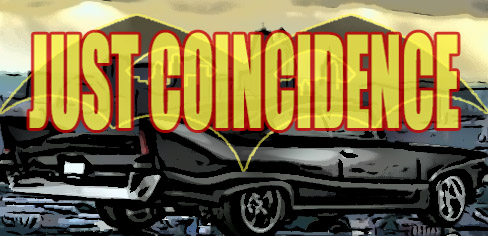 Pierre Anton Taylor’s dark crimefighting serial, Just Coincidence is about a privileged young man with the unremarkable name of Wayne Bruce who returns to the site where his father once had his business, a battery manufacturing plant, and where he often spent his childhood days hanging around the factory and the neighborhood. His return is haunted by the mysterious circumstances surrounding his father’s death and the vague feeling that his uncle is somehow involved. Appalled by the poverty and crime of the place he remembers fondly, he is moved to resolve the injustice of the socially marginalized and to wreak vengeance on those he believes are responsible for the death of his father. The backstory to his emergence as a crimefighter is revealed in Just Coincidence, Interlude II
Pierre Anton Taylor’s dark crimefighting serial, Just Coincidence is about a privileged young man with the unremarkable name of Wayne Bruce who returns to the site where his father once had his business, a battery manufacturing plant, and where he often spent his childhood days hanging around the factory and the neighborhood. His return is haunted by the mysterious circumstances surrounding his father’s death and the vague feeling that his uncle is somehow involved. Appalled by the poverty and crime of the place he remembers fondly, he is moved to resolve the injustice of the socially marginalized and to wreak vengeance on those he believes are responsible for the death of his father. The backstory to his emergence as a crimefighter is revealed in Just Coincidence, Interlude II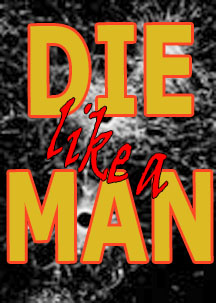



 The new year at Dime Pulp begins with the return of Carriers by Mark DuCharme and it’s gothic air of shadowy creatures who might just be the living dead. Carriers is a vampire novella with touches of black comedy and satirical bite, and is told from the perspective of its unreliable narrator and protagonist, Johnny. It takes place during a “plague” that has been going on for two years in an unnamed city. Dead bodies litter the streets, hallways, and homes. A corpse disposal company hires people like Johnny to transport them to a facility at the edge of town with the very important stipulation that the bodies be delivered there before sundown. No one ever says why. Read more in the latest installment of Carriers,
The new year at Dime Pulp begins with the return of Carriers by Mark DuCharme and it’s gothic air of shadowy creatures who might just be the living dead. Carriers is a vampire novella with touches of black comedy and satirical bite, and is told from the perspective of its unreliable narrator and protagonist, Johnny. It takes place during a “plague” that has been going on for two years in an unnamed city. Dead bodies litter the streets, hallways, and homes. A corpse disposal company hires people like Johnny to transport them to a facility at the edge of town with the very important stipulation that the bodies be delivered there before sundown. No one ever says why. Read more in the latest installment of Carriers, 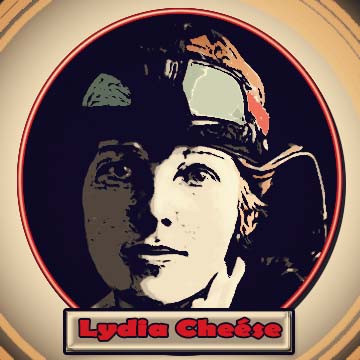 Phyllis Huldarsdottir returns with Cheése Stands Alone, the continuing adventures of Airship Commander Lydia Cheése (pronounced “Chase”) in the search for her anti-Clockwork Commonwealth renegade father, Commodore Jack, with the help Doctor Professor Jean-Pierre Serre-Pain, proprietor the Madame Ophelia’s Ophidiarium, a traveling snake show, and his associates, former circus strongman, Vlady, and Serpina, the snake girl. On the run from IOTA (the Investigative Office of The Admiralty), she has narrowly escapes capture by her nemesis, Chief Inspector Karla Kola, in Oldest Orleans, and now with the help of a young wannabe airship pilot, Pyare, must traverse the Central Massif to rendezvous with Serre-Pain and the dirigible that will take them on a mercy mission to HOAR (the Horn Of Africa Republics), base for the anti-Commonwealth ICERS. Read more of Cheése Stands Alone in
Phyllis Huldarsdottir returns with Cheése Stands Alone, the continuing adventures of Airship Commander Lydia Cheése (pronounced “Chase”) in the search for her anti-Clockwork Commonwealth renegade father, Commodore Jack, with the help Doctor Professor Jean-Pierre Serre-Pain, proprietor the Madame Ophelia’s Ophidiarium, a traveling snake show, and his associates, former circus strongman, Vlady, and Serpina, the snake girl. On the run from IOTA (the Investigative Office of The Admiralty), she has narrowly escapes capture by her nemesis, Chief Inspector Karla Kola, in Oldest Orleans, and now with the help of a young wannabe airship pilot, Pyare, must traverse the Central Massif to rendezvous with Serre-Pain and the dirigible that will take them on a mercy mission to HOAR (the Horn Of Africa Republics), base for the anti-Commonwealth ICERS. Read more of Cheése Stands Alone in 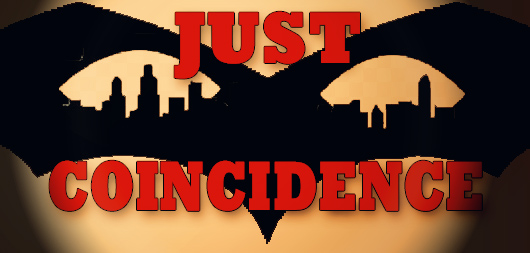 Pierre Anton Taylor’s dark crimefighting serial, Just Coincidence is about a privileged young man with the unremarkable name of Wayne Bruce who returns to the site where his father once had his business, a battery manufacturing plant, and where he often spent his childhood days hanging around the factory and the neighborhood. His return is haunted by the mysterious circumstances surrounding his father’s death and the vague feeling that his uncle is somehow involved. Appalled by the poverty and crime of the place he remembers fondly, he is moved to resolve the injustice of the socially marginalized and to wreak vengeance on those he believes are responsible for the death of his father. The backstory to his emergence as a crimefighter is revealed in
Pierre Anton Taylor’s dark crimefighting serial, Just Coincidence is about a privileged young man with the unremarkable name of Wayne Bruce who returns to the site where his father once had his business, a battery manufacturing plant, and where he often spent his childhood days hanging around the factory and the neighborhood. His return is haunted by the mysterious circumstances surrounding his father’s death and the vague feeling that his uncle is somehow involved. Appalled by the poverty and crime of the place he remembers fondly, he is moved to resolve the injustice of the socially marginalized and to wreak vengeance on those he believes are responsible for the death of his father. The backstory to his emergence as a crimefighter is revealed in  Also returning for the 2024 inaugural issue is Dropping A Dime, the editor’s pithy commentary on pulp fiction, this time asking the vital question
Also returning for the 2024 inaugural issue is Dropping A Dime, the editor’s pithy commentary on pulp fiction, this time asking the vital question 
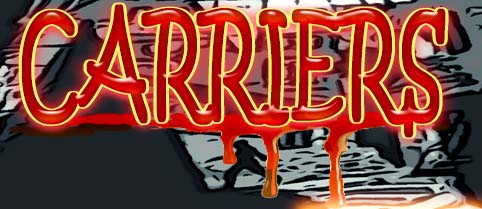 Carriers by Mark DuCharme returns with it’s gothic air of shadowy creatures who might just be the living dead. Carriers is a vampire novella with touches of black comedy and satirical bite, and is told from the perspective of its unreliable narrator and protagonist, Johnny. It takes place during a “plague” that has been going on for two years in an unnamed city. Dead bodies litter the streets, hallways, and homes. A corpse disposal company hires people like Johnny to transport them to a facility at the edge of town with the very important stipulation that the bodies be delivered there before sundown. No one ever says why. Read more in the latest installment of
Carriers by Mark DuCharme returns with it’s gothic air of shadowy creatures who might just be the living dead. Carriers is a vampire novella with touches of black comedy and satirical bite, and is told from the perspective of its unreliable narrator and protagonist, Johnny. It takes place during a “plague” that has been going on for two years in an unnamed city. Dead bodies litter the streets, hallways, and homes. A corpse disposal company hires people like Johnny to transport them to a facility at the edge of town with the very important stipulation that the bodies be delivered there before sundown. No one ever says why. Read more in the latest installment of 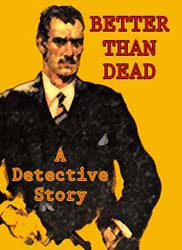 Issue 8 brings to a close Colin Deerwood’s long running serial, Better Than Dead, A Detective Story, featuring the unpredictable peregrinations of private investigator Lackland Ask, aka Stan Gardner, aka Sam Carter, and now Dr. Jerome Paulsen, O.D. leaving on a freighter for Cuba one step ahead of the law, the mob, and the draft board. All the loose ends (and there were many) are tied up or disposed of (are they?), and now the fugitive confidential agent can exit stage left. Find out how the story ends in
Issue 8 brings to a close Colin Deerwood’s long running serial, Better Than Dead, A Detective Story, featuring the unpredictable peregrinations of private investigator Lackland Ask, aka Stan Gardner, aka Sam Carter, and now Dr. Jerome Paulsen, O.D. leaving on a freighter for Cuba one step ahead of the law, the mob, and the draft board. All the loose ends (and there were many) are tied up or disposed of (are they?), and now the fugitive confidential agent can exit stage left. Find out how the story ends in  This issue also introduces a new private eye, Don Coyote, brain child of Mike Servante, a newbie to the musty (and labyrinthine) halls of serial crime fiction although an aficionado of the genre, in a metatextual story that promises to be a lot of fun, titled The Man From La Mirada Perdida, A Don Coyote & Saundra Pansy Adventure. Read inaugural episodes
This issue also introduces a new private eye, Don Coyote, brain child of Mike Servante, a newbie to the musty (and labyrinthine) halls of serial crime fiction although an aficionado of the genre, in a metatextual story that promises to be a lot of fun, titled The Man From La Mirada Perdida, A Don Coyote & Saundra Pansy Adventure. Read inaugural episodes 
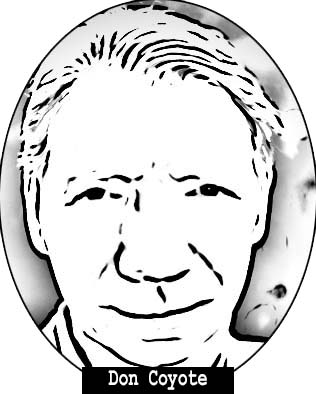 I’m a good judge of character. She was in her late forties, going gray pixie cut that went with the pixie face, dangling silver earrings, intense blue eyes, mascara thick eyelashes, not so subtle green shadowed and precisely drawn eyebrows. Her lipstick was a synthetic shade of orange and probably applied with a palette knife.
I’m a good judge of character. She was in her late forties, going gray pixie cut that went with the pixie face, dangling silver earrings, intense blue eyes, mascara thick eyelashes, not so subtle green shadowed and precisely drawn eyebrows. Her lipstick was a synthetic shade of orange and probably applied with a palette knife.  I don’t know who he thought he was, thinning red hair, tall and gangly with quite a beak, too. He dressed conservatively for this neck of the woods, slacks, open collar shirt. I’ll admit I was desperate. After Jake’s passing, I had to keep up the house payments and that meant cutting corners on other necessities. Besides, being housebound as a homemaker for a couple dozen years, I was ready to re-experience life as a single woman.
I don’t know who he thought he was, thinning red hair, tall and gangly with quite a beak, too. He dressed conservatively for this neck of the woods, slacks, open collar shirt. I’ll admit I was desperate. After Jake’s passing, I had to keep up the house payments and that meant cutting corners on other necessities. Besides, being housebound as a homemaker for a couple dozen years, I was ready to re-experience life as a single woman.
 Phyllis Huldarsdottir returns with the continuing adventures of Airship Commander Lydia Cheése (pronounced “Chase”) searching for her anti-Commonwealth renegade father, Commodore Jack, with the help Doctor Professor Jean-Pierre Serre-Pain, proprietor the Madame Ophelia’s Ophidiarium, a traveling snake show, and his associates, former circus strongman, Vlady, and Serpina, the snake girl. On the run from IOTA (the Investigative Office of The Admiralty), she has narrowly escapes capture by her nemesis, Chief Inspector Karla Kola, in Oldest Orleans, and now with the help of a young wannabe airship pilot, Pyare, must traverse the Central Massif to rendezvous with Serre-Pain and the dirigible that will take them on a mercy mission to HOAR (the Horn Of Africa Republics), base for the anti-Commonwealth ICERS. Read more in
Phyllis Huldarsdottir returns with the continuing adventures of Airship Commander Lydia Cheése (pronounced “Chase”) searching for her anti-Commonwealth renegade father, Commodore Jack, with the help Doctor Professor Jean-Pierre Serre-Pain, proprietor the Madame Ophelia’s Ophidiarium, a traveling snake show, and his associates, former circus strongman, Vlady, and Serpina, the snake girl. On the run from IOTA (the Investigative Office of The Admiralty), she has narrowly escapes capture by her nemesis, Chief Inspector Karla Kola, in Oldest Orleans, and now with the help of a young wannabe airship pilot, Pyare, must traverse the Central Massif to rendezvous with Serre-Pain and the dirigible that will take them on a mercy mission to HOAR (the Horn Of Africa Republics), base for the anti-Commonwealth ICERS. Read more in 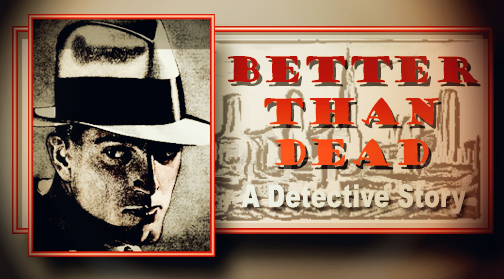 Last but certainly not least, Colin Deerwood’s long running serial, Better Than Dead, A Detective Story, continues its unpredictable peregrinations featuring private detective Lackland Ask, aka Stan Gardner, aka Sam Carter, on the run again when he learns that his bucolic hideaway in the Three Lakes area is also where his nemesis, mob boss Yan Kovic, aka Mr. K, is ducking the feds. Now it is even more imperative that he make himself scarce, especially after a crooked local constable in league with Mr. K’s hoods try to finish him off. In the meantime, thanks to the moonshiner’s daughter and a lusty cousin, he learns a surprising revelation about his paternity. On his return to the big city from the country, still on the lam, Lackland Ask has to scare up some cash and make plans to flee the country under an assumed name with one minor hitch: he has to be blind. Read more in
Last but certainly not least, Colin Deerwood’s long running serial, Better Than Dead, A Detective Story, continues its unpredictable peregrinations featuring private detective Lackland Ask, aka Stan Gardner, aka Sam Carter, on the run again when he learns that his bucolic hideaway in the Three Lakes area is also where his nemesis, mob boss Yan Kovic, aka Mr. K, is ducking the feds. Now it is even more imperative that he make himself scarce, especially after a crooked local constable in league with Mr. K’s hoods try to finish him off. In the meantime, thanks to the moonshiner’s daughter and a lusty cousin, he learns a surprising revelation about his paternity. On his return to the big city from the country, still on the lam, Lackland Ask has to scare up some cash and make plans to flee the country under an assumed name with one minor hitch: he has to be blind. Read more in 
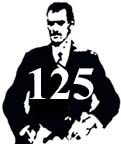
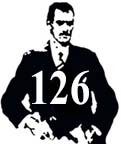
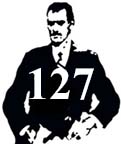
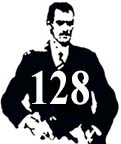
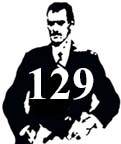


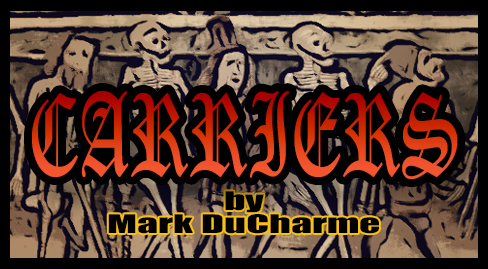 Dime Pulp is please to introduce a new seral fiction titled Carriers by Mark DuCharme (yes, that’s his real name). Born in Detroit, Michigan, Mark earned a BA from the University of Michigan and moved to Colorado in 1990 to attend the Jack Kerouac School of Disembodied Poetics at Naropa University, where he earned an MFA. A widely published author, Mark lives in Boulder where he works as an English instructor. Carriers is a vampire novella with touches of black comedy and satirical bite, and is told from the perspective of its unreliable narrator and protagonist, Johnny. It takes place during a “plague” that has been going on for two years in an unnamed city. Dead bodies litter the streets, hallways, and homes. A corpse disposal company hires people like Johnny to transport them to a facility at the edge of town with the very important stipulation that the bodies be delivered there before sundown. No one ever says why. Read Carriers,
Dime Pulp is please to introduce a new seral fiction titled Carriers by Mark DuCharme (yes, that’s his real name). Born in Detroit, Michigan, Mark earned a BA from the University of Michigan and moved to Colorado in 1990 to attend the Jack Kerouac School of Disembodied Poetics at Naropa University, where he earned an MFA. A widely published author, Mark lives in Boulder where he works as an English instructor. Carriers is a vampire novella with touches of black comedy and satirical bite, and is told from the perspective of its unreliable narrator and protagonist, Johnny. It takes place during a “plague” that has been going on for two years in an unnamed city. Dead bodies litter the streets, hallways, and homes. A corpse disposal company hires people like Johnny to transport them to a facility at the edge of town with the very important stipulation that the bodies be delivered there before sundown. No one ever says why. Read Carriers, 
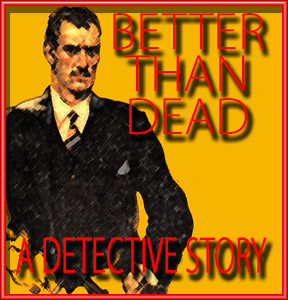 “Lackland Ask is the name. ‘Lack’ to my friends, ‘Don’t’ to those who think they’re funny. You might have seen my portrait on the cover of Black Mask, the crime fiction magazine. This is my story. It starts with a blonde. This kind of story always starts with a blonde.” Thus begins the seemingly non-stop, endless narrative of Better Than Dead in which women are not the only trouble although most of it, told with the wit and street savvy of Runyon and Parker.
“Lackland Ask is the name. ‘Lack’ to my friends, ‘Don’t’ to those who think they’re funny. You might have seen my portrait on the cover of Black Mask, the crime fiction magazine. This is my story. It starts with a blonde. This kind of story always starts with a blonde.” Thus begins the seemingly non-stop, endless narrative of Better Than Dead in which women are not the only trouble although most of it, told with the wit and street savvy of Runyon and Parker. In Just Coincidence, a privileged young man with the unremarkable name of Wayne Bruce returns to the site where his father once had his business, a battery manufacturing plant, and where he often spent his childhood days hanging around the factory and the neighborhood. His return is haunted by the mysterious circumstances surrounding his father’s death and the vague feeling that his uncle is somehow involved. Appalled by the poverty and crime of the place he remembers fondly, he is moved to resolve the injustice of the socially marginalized and to wreak vengeance on those he believes are responsible for the death of his father. A personal coincidence brings together dark prince and dark knight joined in a fateful and tragic quest for justice.
In Just Coincidence, a privileged young man with the unremarkable name of Wayne Bruce returns to the site where his father once had his business, a battery manufacturing plant, and where he often spent his childhood days hanging around the factory and the neighborhood. His return is haunted by the mysterious circumstances surrounding his father’s death and the vague feeling that his uncle is somehow involved. Appalled by the poverty and crime of the place he remembers fondly, he is moved to resolve the injustice of the socially marginalized and to wreak vengeance on those he believes are responsible for the death of his father. A personal coincidence brings together dark prince and dark knight joined in a fateful and tragic quest for justice.







